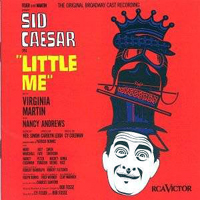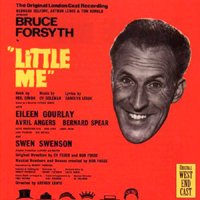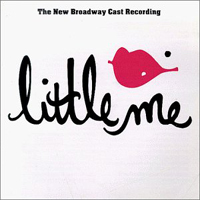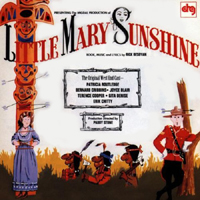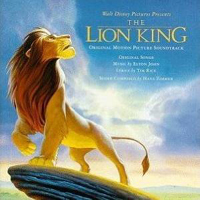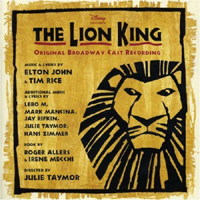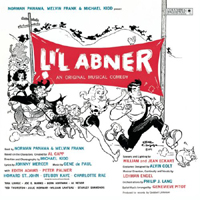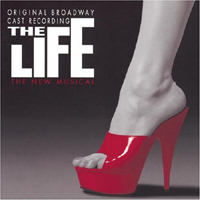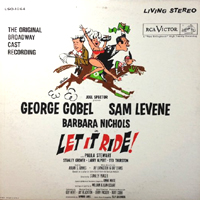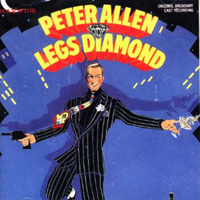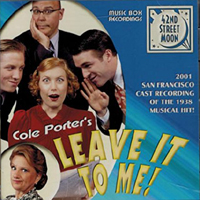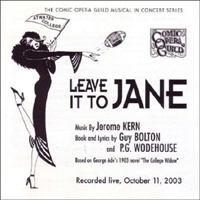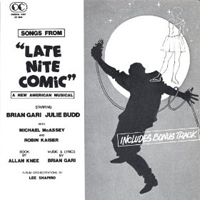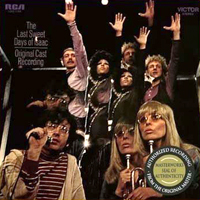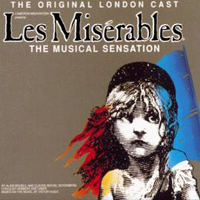 Original London Cast, 1985 (First Night/Relativity, 2CDs)
Original London Cast, 1985 (First Night/Relativity, 2CDs)  (2 / 5) Claude-Michel Schönberg (“musique”) and Alain Boublil and Jean-Marc Natel (“textes”) originally created Les Misérables as what amounted to a song cycle inspired by Victor Hugo’s massive novel of the same title. The 1980 French-language “concept album” of that work contains less than 90 minutes of material. No doubt assuming that every self-respecting Frenchman knows the novel well, the creators did not try to cover the entire plot in the songs they wrote. But when British producer Cameron Mackintosh saw a stage version of the work in Paris, he decided that Les Miz (or Les Mis), as it would come to be known the world over, should be translated into English and turned into a through-sung musical that would attempt to tell the full story of Hugo’s epic work. Herbert Kretzmer was hired to do the English adaptation, and he performed this herculean task probably as well as anyone could have done, but that doesn’t mean the result is an artistic success. The problem is that, although the Mackintosh Les Misérables is more than twice as long as the original French version, Schönberg wrote only a comparatively small amount of new music for it. The extra hour and a half contains pages of banal sung dialogue and endless recycling of music that make no sense. To offer only two examples of the latter: The gorgeous melody that’s first heard in Fantine’s deathbed lament “Come to Me” is later repeated note-for-note as Eponine’s “On My Own,” with only the key and lyrics changed; and the tune of the prostitutes’ Act I song “Lovely Ladies” recurs in Act II in a completely unrelated context, sung by a group of women mourning the dead revolutionaries. (Les Miz probably would have been much better as a book musical with spoken-dialogue scenes, rather than a sung-through work. That approach would have served the double purpose of allowing more of the plot to be covered in less time while avoiding the repetition of so many melodies with alternate lyrics.) Among the score’s best moments are “At the End of the Day,” a moving song for the wretched masses; the students’ stirring anthem “Do You Hear the People Sing?”; and Marius’ “Empty Chairs at Empty Tables,” affectingly performed by the young Michael Ball on this recording. Colm Wilkinson displays a magnificent, versatile voice in the role of Jean Valjean, though some listeners may find it hard to adjust to his odd accent and mannerisms. Patti LuPone is superb in the brief role of Fantine, singing the beautiful “I Dreamed a Dream” for all its worth; and Roger Allam is dramatically committed as Inspector Javert, if a little insecure from a vocal standpoint. As Eponine, Frances Ruffelle sounds mush-mouthed and whiny. Sue Jane Tanner and Alun Armstrong are somewhat amusing as the Thénardiers, but the fact that these originally evil characters are used for comic relief in the musical is indicative of the show’s larger problems. — Michael Portantiere
(2 / 5) Claude-Michel Schönberg (“musique”) and Alain Boublil and Jean-Marc Natel (“textes”) originally created Les Misérables as what amounted to a song cycle inspired by Victor Hugo’s massive novel of the same title. The 1980 French-language “concept album” of that work contains less than 90 minutes of material. No doubt assuming that every self-respecting Frenchman knows the novel well, the creators did not try to cover the entire plot in the songs they wrote. But when British producer Cameron Mackintosh saw a stage version of the work in Paris, he decided that Les Miz (or Les Mis), as it would come to be known the world over, should be translated into English and turned into a through-sung musical that would attempt to tell the full story of Hugo’s epic work. Herbert Kretzmer was hired to do the English adaptation, and he performed this herculean task probably as well as anyone could have done, but that doesn’t mean the result is an artistic success. The problem is that, although the Mackintosh Les Misérables is more than twice as long as the original French version, Schönberg wrote only a comparatively small amount of new music for it. The extra hour and a half contains pages of banal sung dialogue and endless recycling of music that make no sense. To offer only two examples of the latter: The gorgeous melody that’s first heard in Fantine’s deathbed lament “Come to Me” is later repeated note-for-note as Eponine’s “On My Own,” with only the key and lyrics changed; and the tune of the prostitutes’ Act I song “Lovely Ladies” recurs in Act II in a completely unrelated context, sung by a group of women mourning the dead revolutionaries. (Les Miz probably would have been much better as a book musical with spoken-dialogue scenes, rather than a sung-through work. That approach would have served the double purpose of allowing more of the plot to be covered in less time while avoiding the repetition of so many melodies with alternate lyrics.) Among the score’s best moments are “At the End of the Day,” a moving song for the wretched masses; the students’ stirring anthem “Do You Hear the People Sing?”; and Marius’ “Empty Chairs at Empty Tables,” affectingly performed by the young Michael Ball on this recording. Colm Wilkinson displays a magnificent, versatile voice in the role of Jean Valjean, though some listeners may find it hard to adjust to his odd accent and mannerisms. Patti LuPone is superb in the brief role of Fantine, singing the beautiful “I Dreamed a Dream” for all its worth; and Roger Allam is dramatically committed as Inspector Javert, if a little insecure from a vocal standpoint. As Eponine, Frances Ruffelle sounds mush-mouthed and whiny. Sue Jane Tanner and Alun Armstrong are somewhat amusing as the Thénardiers, but the fact that these originally evil characters are used for comic relief in the musical is indicative of the show’s larger problems. — Michael Portantiere
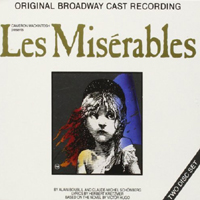 Original Broadway Cast, 1987 (Decca, 2CDs)
Original Broadway Cast, 1987 (Decca, 2CDs)  (2 / 5) There are a few reasons to consider this recording as an alternative or addendum to the one reviewed above. Randy Graff is a wonderful Fantine, Terrence Mann as Javert has better vocal technique than Roger Allam, and Michael Maguire is a stalwart Enjolras. This recording also contains some music not to be heard on the original London cast album, most notably Jean Valjean’s “Bring Him Home” — a truly beautiful song, even if its main melody sounds like that of the “Humming Chorus” from Puccini’s Madama Butterfly, a debt that Claude-Michel Schönberg has reportedly acknowledged. Otherwise, this two-disc set isn’t a whole lot different from its predecessor. Colm Wilkinson and Frances Ruffelle are back as Valjean and Eponine, the latter an unfortunate return to the ears of some listeners. — M.P.
(2 / 5) There are a few reasons to consider this recording as an alternative or addendum to the one reviewed above. Randy Graff is a wonderful Fantine, Terrence Mann as Javert has better vocal technique than Roger Allam, and Michael Maguire is a stalwart Enjolras. This recording also contains some music not to be heard on the original London cast album, most notably Jean Valjean’s “Bring Him Home” — a truly beautiful song, even if its main melody sounds like that of the “Humming Chorus” from Puccini’s Madama Butterfly, a debt that Claude-Michel Schönberg has reportedly acknowledged. Otherwise, this two-disc set isn’t a whole lot different from its predecessor. Colm Wilkinson and Frances Ruffelle are back as Valjean and Eponine, the latter an unfortunate return to the ears of some listeners. — M.P.
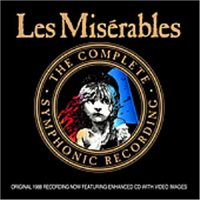 The Complete Symphonic Recording, 1988 (First Night, 3CDs)
The Complete Symphonic Recording, 1988 (First Night, 3CDs)  (1 / 5) The star here is Gary Morris, an American country-western singer who had played Valjean early in the run of the original Broadway production of Les Misérables. Unfortunately, Morris’ accent and mannerisms are just as odd as Colm Wilkinson’s in the role, and his voice isn’t nearly as good. As heard here, Morris has a vibrato so wide that it’s really a wobble; every sustained note he sings is really two notes, and it isn’t pretty. Given that his singing of the show’s central role is almost unlistenable, the strengths of this recording seem beside the point. Still, for what it’s worth: Philip Quast as Javert and Anthony Warlow as Enjolras are excellent, Michael Ball is back as Marius, and Tracy Shayne sings prettily as Cossette. Also, Debbie Byrne as Fantine delivers the high notes of “I Dreamed a Dream” without belting, and some listeners may therefore prefer her performance to Patti LuPone’s and Randy Graff’s. As Eponine, Kaho Shimada has a better voice than Frances Ruffelle — but, annoyingly, she seems to imitate Ruffelle’s inflections and enunciations. The London Philharmonia orchestra sounds huge and impressive. This is a complete recording of the score, but none of the extra music you’ll find here is worth writing home about. — M.P.
(1 / 5) The star here is Gary Morris, an American country-western singer who had played Valjean early in the run of the original Broadway production of Les Misérables. Unfortunately, Morris’ accent and mannerisms are just as odd as Colm Wilkinson’s in the role, and his voice isn’t nearly as good. As heard here, Morris has a vibrato so wide that it’s really a wobble; every sustained note he sings is really two notes, and it isn’t pretty. Given that his singing of the show’s central role is almost unlistenable, the strengths of this recording seem beside the point. Still, for what it’s worth: Philip Quast as Javert and Anthony Warlow as Enjolras are excellent, Michael Ball is back as Marius, and Tracy Shayne sings prettily as Cossette. Also, Debbie Byrne as Fantine delivers the high notes of “I Dreamed a Dream” without belting, and some listeners may therefore prefer her performance to Patti LuPone’s and Randy Graff’s. As Eponine, Kaho Shimada has a better voice than Frances Ruffelle — but, annoyingly, she seems to imitate Ruffelle’s inflections and enunciations. The London Philharmonia orchestra sounds huge and impressive. This is a complete recording of the score, but none of the extra music you’ll find here is worth writing home about. — M.P.
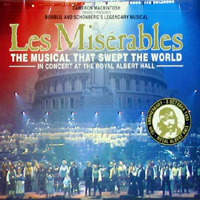 London Concert Cast, 1995 (First Night, 2CDs)
London Concert Cast, 1995 (First Night, 2CDs)  (2 / 5) This is a live recording of a concert that was given at the Royal Albert Hall to mark the tenth anniversary of the opening of Les Misérables in London, and there’s quite a sense of occasion about it. In total, some 250 performers took part, and the orchestra is no less than the Royal Philharmonic, conducted by David Charles Abell. At the end of the second disc, Jean Valjeans from many worldwide companies may be heard delivering various lines of “Do You Hear the People Sing?” in various languages. If you want to choose only one recording of this score for your library, this may be your best option. To begin with, it’s the only one that gives you Colm Wilkinson as Valjean while allowing you to avoid Frances Ruffelle as Eponine, should you choose to do so. Here, Eponine is Lea Salonga, whose lovely, unaffected singing of “On My Own” and the rest of the character’s music is a great pleasure. Other major roles are filled by some of the most talented singing actors to have played them: Philip Quast as Javert, Ruthie Henshall as Fantine, Michael Ball as Marius, Michael Maguire as Enjolras, and Judy Kuhn as Cossette. Note that a video recording of this concert is also available. — M.P.
(2 / 5) This is a live recording of a concert that was given at the Royal Albert Hall to mark the tenth anniversary of the opening of Les Misérables in London, and there’s quite a sense of occasion about it. In total, some 250 performers took part, and the orchestra is no less than the Royal Philharmonic, conducted by David Charles Abell. At the end of the second disc, Jean Valjeans from many worldwide companies may be heard delivering various lines of “Do You Hear the People Sing?” in various languages. If you want to choose only one recording of this score for your library, this may be your best option. To begin with, it’s the only one that gives you Colm Wilkinson as Valjean while allowing you to avoid Frances Ruffelle as Eponine, should you choose to do so. Here, Eponine is Lea Salonga, whose lovely, unaffected singing of “On My Own” and the rest of the character’s music is a great pleasure. Other major roles are filled by some of the most talented singing actors to have played them: Philip Quast as Javert, Ruthie Henshall as Fantine, Michael Ball as Marius, Michael Maguire as Enjolras, and Judy Kuhn as Cossette. Note that a video recording of this concert is also available. — M.P.
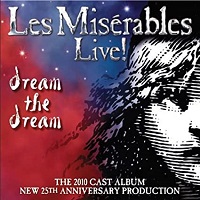 Manchester Concert Cast, 2010 (First Night, 2CDs)
Manchester Concert Cast, 2010 (First Night, 2CDs)  (2 / 5) Here’s a live recording of a concert that was presented at the Palace Theatre in Manchester, England on December 12, 2009 — but the album was released in 2010, hence the date on the packaging. With new orchestrations that were first introduced in 2006, the concert was intended to commemorate 25 years of Les Misérables in English; it should not be confused with the 25th anniversary concert that starred Alfie Boe, Norm Lewis, Nick Jonas, Lea Salonga, et al., separately available on video but not in the form of an audio-only cast album. (Some would say there are more recordings of Les Miz than necessary, and that a few of them are confusingly labeled.) The cast here is headed by John-Owen Jones as Valjean, Earl Carpenter as Javert, and Madalena Alberto as Fantine, with Gareth Gates as Marius, Katie Hall as Cosette, Jon Robyns as Enjolras, Rosalind James as Eponine, Katie Hall as Cosette, and Ashley Artus and Lynne Wilmot as the Thénardiers. All of the performances are fine if not especially distinctive, perhaps with the exception of Alberto; she brings to “I Dreamed a Dream” a sweet-yet-strong tone that allows her to communicate the emotional power of the song without sounding unpleasant when she gets to the high-belt sections of it. New orchestrations by Stephen Metcalfe and Chris Jahnke do not sound significantly different from the originals, so one might question the point behind them. — M.P.
(2 / 5) Here’s a live recording of a concert that was presented at the Palace Theatre in Manchester, England on December 12, 2009 — but the album was released in 2010, hence the date on the packaging. With new orchestrations that were first introduced in 2006, the concert was intended to commemorate 25 years of Les Misérables in English; it should not be confused with the 25th anniversary concert that starred Alfie Boe, Norm Lewis, Nick Jonas, Lea Salonga, et al., separately available on video but not in the form of an audio-only cast album. (Some would say there are more recordings of Les Miz than necessary, and that a few of them are confusingly labeled.) The cast here is headed by John-Owen Jones as Valjean, Earl Carpenter as Javert, and Madalena Alberto as Fantine, with Gareth Gates as Marius, Katie Hall as Cosette, Jon Robyns as Enjolras, Rosalind James as Eponine, Katie Hall as Cosette, and Ashley Artus and Lynne Wilmot as the Thénardiers. All of the performances are fine if not especially distinctive, perhaps with the exception of Alberto; she brings to “I Dreamed a Dream” a sweet-yet-strong tone that allows her to communicate the emotional power of the song without sounding unpleasant when she gets to the high-belt sections of it. New orchestrations by Stephen Metcalfe and Chris Jahnke do not sound significantly different from the originals, so one might question the point behind them. — M.P.
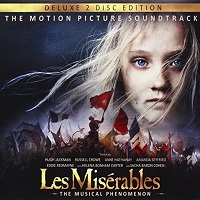 Film Soundtrack, 2012 (Republic Records, 2CDs)
Film Soundtrack, 2012 (Republic Records, 2CDs)  (1 / 5) A box-office hit, the film version of Les Misérables earned some critical praise for director Tom Hooper’s big-screen adaptation of the musical in a way that made for somewhat clearer storytelling and more effective drama than the original stage production had to offer, yet the film and its soundtrack album must be regarded as a failure in that at least two of the stars are seriously over-parted from a vocal standpoint. Hugh Jackman began his career in musical theater, and he had great success in that sphere in such roles as Curly in Oklahoma! and Peter Allen in The Boy From Oz, but it turned out that his voice is just not right for Jean Valjean in Les Mis in terms of timbre, power, or technique, often exhibiting a buzz-saw quality and a significant wobble. Even more of a trial to hear is Russell Crowe, who as Javert sounds like exactly what he is: a movie star with lots of screen presence but almost no singing experience or ability. Vocal honors for the film go to Anne Hathaway as Fantine and Samantha Barks as Eponine, who respectively offer moving performances of “I Dreamed a Dream” and “On My Own.” Aaron Tveit, from Broadway, brings a strong baritenor to Enjolras, and Eddie Redmayne as Marius sings surprisingly well considering that he, too, was not previously known as a vocalist, but Amanda Seyfried’s soprano sounds wispy and fluttery in Cosette’s music. Sacha Baron Cohen is fun as Thénardier, and as his wife, Helena Bonham Carter is not woefully miscast as she was in the film of Sweeney Todd. Note: When this movie was released, much was made of the fact that a very large percentage of the singing in it was performed live during filming, which presumably was a further handicap for Jackman and Crowe in particular. — M.P.
(1 / 5) A box-office hit, the film version of Les Misérables earned some critical praise for director Tom Hooper’s big-screen adaptation of the musical in a way that made for somewhat clearer storytelling and more effective drama than the original stage production had to offer, yet the film and its soundtrack album must be regarded as a failure in that at least two of the stars are seriously over-parted from a vocal standpoint. Hugh Jackman began his career in musical theater, and he had great success in that sphere in such roles as Curly in Oklahoma! and Peter Allen in The Boy From Oz, but it turned out that his voice is just not right for Jean Valjean in Les Mis in terms of timbre, power, or technique, often exhibiting a buzz-saw quality and a significant wobble. Even more of a trial to hear is Russell Crowe, who as Javert sounds like exactly what he is: a movie star with lots of screen presence but almost no singing experience or ability. Vocal honors for the film go to Anne Hathaway as Fantine and Samantha Barks as Eponine, who respectively offer moving performances of “I Dreamed a Dream” and “On My Own.” Aaron Tveit, from Broadway, brings a strong baritenor to Enjolras, and Eddie Redmayne as Marius sings surprisingly well considering that he, too, was not previously known as a vocalist, but Amanda Seyfried’s soprano sounds wispy and fluttery in Cosette’s music. Sacha Baron Cohen is fun as Thénardier, and as his wife, Helena Bonham Carter is not woefully miscast as she was in the film of Sweeney Todd. Note: When this movie was released, much was made of the fact that a very large percentage of the singing in it was performed live during filming, which presumably was a further handicap for Jackman and Crowe in particular. — M.P.
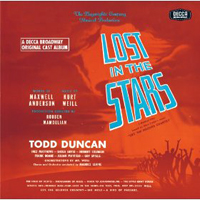 Original Broadway Cast, 1949 (Decca)
Original Broadway Cast, 1949 (Decca)  (3 / 5) Lost in the Stars, by playwright Maxwell Anderson and composer Kurt Weill, deals with racial discrimination and segregation — unlikely territory for a Broadway musical in 1940s America. With its operatic dimensions and somber tone, the show elicited mixed but largely approving notices. Weill and Anderson based their work on Alan Paton’s Cry, the Beloved Country, a 1948 novel that contrasts the natural beauty of South Africa with the brutality of its apartheid policy. As in the novel, the protagonist is a Zulu (played by Todd Duncan) ordained to the Anglican priesthood, whose son kills a white man in the course of committing a robbery and is tried for murder, convicted, and hanged. The story concludes with the reconciliation of two bereaved fathers, the black priest and the white man whose son was killed. Anderson’s Iibretto and Weill’s magnificent score take liberties with Paton’s material; in fact, after seeing Lost in the Stars, the novelist wrote that he regretted giving its adapters the rights to his book. The musical featured a Greek chorus narrating and commenting on the action. Virgil Thomson, in his review for the New York Herald Tribune, called the show a singspiel; the chorus performs an inordinate amount of the score, leaving little for the principals to do. The recording contains about 45 minutes of music, with Maurice Levine conducting a 12-piece chamber ensemble, orchestrations by Weill. The spoken dialogue is somewhat wooden, and some of the singing is weak. — Charles Wright
(3 / 5) Lost in the Stars, by playwright Maxwell Anderson and composer Kurt Weill, deals with racial discrimination and segregation — unlikely territory for a Broadway musical in 1940s America. With its operatic dimensions and somber tone, the show elicited mixed but largely approving notices. Weill and Anderson based their work on Alan Paton’s Cry, the Beloved Country, a 1948 novel that contrasts the natural beauty of South Africa with the brutality of its apartheid policy. As in the novel, the protagonist is a Zulu (played by Todd Duncan) ordained to the Anglican priesthood, whose son kills a white man in the course of committing a robbery and is tried for murder, convicted, and hanged. The story concludes with the reconciliation of two bereaved fathers, the black priest and the white man whose son was killed. Anderson’s Iibretto and Weill’s magnificent score take liberties with Paton’s material; in fact, after seeing Lost in the Stars, the novelist wrote that he regretted giving its adapters the rights to his book. The musical featured a Greek chorus narrating and commenting on the action. Virgil Thomson, in his review for the New York Herald Tribune, called the show a singspiel; the chorus performs an inordinate amount of the score, leaving little for the principals to do. The recording contains about 45 minutes of music, with Maurice Levine conducting a 12-piece chamber ensemble, orchestrations by Weill. The spoken dialogue is somewhat wooden, and some of the singing is weak. — Charles Wright Studio Cast, 1993 (MusicMasters Classics)
Studio Cast, 1993 (MusicMasters Classics)  (4 / 5) As general director and principal conductor of the New York City Opera in the late 1950s, Julius Rudel rescued Lost in the Stars from obscurity by introducing it into his company’s repertoire. Thirty-five years later, Rudel conducted this definitive recording of the beautiful Weill-Anderson score. Leading the Orchestra of St. Luke’s, he utilized more musicians than Weill ever envisioned, and he searched the worlds of opera and musical theater to find a dream cast. Notable among the vocalists are Arthur Woodley, who not only sings exquisitely but also brings poignancy to Stephen Kumalo’s Act II soliloquy; Cynthia Clarey, who renders “Stay Well” and “Trouble Man” with tenderness; and Carol Woods, who belts “Who’ll Buy?” with flair. But the true stars of this recording are the members of the Concert Chorale of New York and tenor Gregory Hopkins as chorus leader. While the original Broadway album retains considerable historical interest, the superior vocalism and the ample orchestral sound of Rudel’s studio version eclipses the earlier release. — C.W.
(4 / 5) As general director and principal conductor of the New York City Opera in the late 1950s, Julius Rudel rescued Lost in the Stars from obscurity by introducing it into his company’s repertoire. Thirty-five years later, Rudel conducted this definitive recording of the beautiful Weill-Anderson score. Leading the Orchestra of St. Luke’s, he utilized more musicians than Weill ever envisioned, and he searched the worlds of opera and musical theater to find a dream cast. Notable among the vocalists are Arthur Woodley, who not only sings exquisitely but also brings poignancy to Stephen Kumalo’s Act II soliloquy; Cynthia Clarey, who renders “Stay Well” and “Trouble Man” with tenderness; and Carol Woods, who belts “Who’ll Buy?” with flair. But the true stars of this recording are the members of the Concert Chorale of New York and tenor Gregory Hopkins as chorus leader. While the original Broadway album retains considerable historical interest, the superior vocalism and the ample orchestral sound of Rudel’s studio version eclipses the earlier release. — C.W.

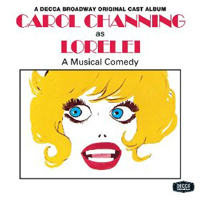
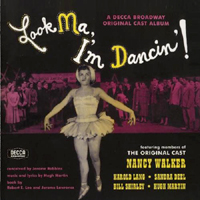
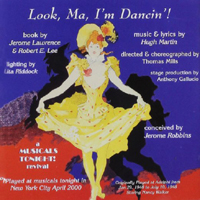
 (2 / 5) Musicals Tonight! is a very well-meaning New York company that mounts concert performances of old musicals. It consistently chooses the most interesting titles of all the NYC concert-musical series, and its tickets are far less expensive than any of the others. This recording documents the group’s presentation of Look, Ma, I’m Dancin’! — apparently, the first since the original Broadway run. I’m fond of this material and Hugh Martin’s writing in general, but I can’t say that this album is very impressive, even if it does include five songs that are not to be found on the Broadway cast album. Except for Rob Lorey, none of the performers here sings with any distinctive sense of character. — D.W.
(2 / 5) Musicals Tonight! is a very well-meaning New York company that mounts concert performances of old musicals. It consistently chooses the most interesting titles of all the NYC concert-musical series, and its tickets are far less expensive than any of the others. This recording documents the group’s presentation of Look, Ma, I’m Dancin’! — apparently, the first since the original Broadway run. I’m fond of this material and Hugh Martin’s writing in general, but I can’t say that this album is very impressive, even if it does include five songs that are not to be found on the Broadway cast album. Except for Rob Lorey, none of the performers here sings with any distinctive sense of character. — D.W. 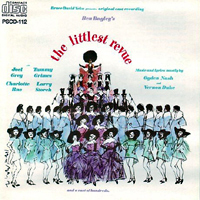

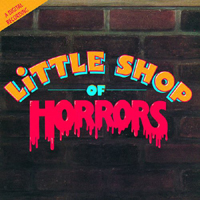
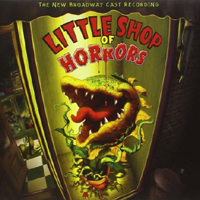
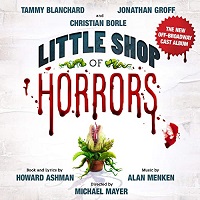
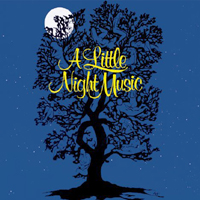
 (5 / 5) A Little Night Music is emblematic of composer-lyricist Stephen Sondheim’s work in that it sounds very different from his other scores and yet is clearly the creation of one of the musical theater’s true geniuses. Based on Ingmar Bergman’s film Smiles of a Summer Night, with a book by Hugh Wheeler, the show features songs that are gorgeously romantic, witty, and heartbreaking by turns, all of them benefiting greatly from Jonathan Tunick’s lush orchestrations. Though excellent overall, the cast album is somewhat disappointing in that the vocal limitations of Glynis Johns as Desirée Armfeldt and Patricia Elliott as Countess Charlotte prevent them from giving fully satisfying performances of their songs. Elliott sings her lines in “Every Day a Little Death” and “A Weekend in the Country” with little or no nuance; Johns gives oddly flat readings of her semi-spoken lines in “You Must Meet My Wife,” and although her rendition of “Send in the Clowns” is heartfelt, she struggles with some of the notes because the bulk of the music lies right around her register break. However, the rest of the cast is superb. Len Cariou and Laurence Guittard sing beautifully as Frederik Egerman and Carl-Magnus Malcolm, respectively. Victoria Mallory brings a resplendent soprano to the role of Anne Egerman, yet she manages to sound convincingly young, as the character must be for the plot of this show to make sense. Ditto tenor Mark Lambert as Henrik, whose singing in “Later” and “A Weekend in the Country” is perfect in both musical and dramatic terms. Hermione Gingold’s performance of Madame Armfeldt’s “Liaisons” is full of personality, and a major highlight of the recording is D’Jamin-Bartlett’s rendition of one of the best, smartest, most deeply affecting songs in the score, “The Miller’s Son.” — Michael Portantiere
(5 / 5) A Little Night Music is emblematic of composer-lyricist Stephen Sondheim’s work in that it sounds very different from his other scores and yet is clearly the creation of one of the musical theater’s true geniuses. Based on Ingmar Bergman’s film Smiles of a Summer Night, with a book by Hugh Wheeler, the show features songs that are gorgeously romantic, witty, and heartbreaking by turns, all of them benefiting greatly from Jonathan Tunick’s lush orchestrations. Though excellent overall, the cast album is somewhat disappointing in that the vocal limitations of Glynis Johns as Desirée Armfeldt and Patricia Elliott as Countess Charlotte prevent them from giving fully satisfying performances of their songs. Elliott sings her lines in “Every Day a Little Death” and “A Weekend in the Country” with little or no nuance; Johns gives oddly flat readings of her semi-spoken lines in “You Must Meet My Wife,” and although her rendition of “Send in the Clowns” is heartfelt, she struggles with some of the notes because the bulk of the music lies right around her register break. However, the rest of the cast is superb. Len Cariou and Laurence Guittard sing beautifully as Frederik Egerman and Carl-Magnus Malcolm, respectively. Victoria Mallory brings a resplendent soprano to the role of Anne Egerman, yet she manages to sound convincingly young, as the character must be for the plot of this show to make sense. Ditto tenor Mark Lambert as Henrik, whose singing in “Later” and “A Weekend in the Country” is perfect in both musical and dramatic terms. Hermione Gingold’s performance of Madame Armfeldt’s “Liaisons” is full of personality, and a major highlight of the recording is D’Jamin-Bartlett’s rendition of one of the best, smartest, most deeply affecting songs in the score, “The Miller’s Son.” — Michael Portantiere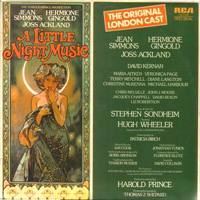
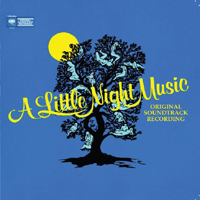
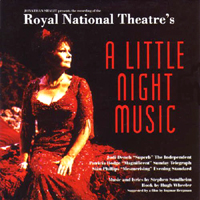
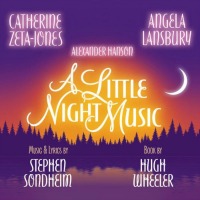
 (1 / 5) While this recording is mostly unsatisfactory in its own right, by no means does it make clear just how far off the mark was the 2009 Broadway revival of A Little Night Music, disastrously misdirected by Trevor Nunn. The visual component of Nunn’s staging is, of course, absent here, nor are we subjected to David Farley’s all-wrong scenic design. The tiny “orchestra” heard on the album, though still completely inadequate for Sondheim’s glorious score, is slightly augmented in size from the pitifully minuscule group that was employed at the Walter Kerr Theatre for this production, and the general inwardness of the cast’s performances is less damaging on the recording than it was live; listen, for example, to Catherine Zeta-Jones’ and Alexander Hanson’s hyper-intimate reading of the Desirée-Frederik dialogue scene before “Send in the Clowns.” Even the one piece of miscasting among the leads, Aaron Lazar as Carl-Magnus, isn’t a major problem here, because he was wrong for the role more in terms of physical than vocal type. Somehow holding their heads above water, Zeta-Jones, Erin Davie, and Leigh Ann Larkin are quite good overall as Desirée, Charlotte, and Petra respectively, while the great Angela Lansbury is one of the best-ever Mme. Armfeldts, her performance here helped by the inclusion of so much dialogue on the recording. Faring less well due to Nunn’s misguidance is Ramona Mallory with a weird characterization of Anne, although the beauty of her singing voice is happily very much in evidence. (Ramona is the daughter of Victoria Mallory and Mark Lambert, the original Broadway Anne and Henrik.) There are sections of Henrik’s music in which Hunter Ryan Herdlicka demonstrates that he does have the vocal chops for the role, so it’s a pity that he delivers the high notes in “Later” and “A Weekend in the Country” in a blaring straight tone, presumably for “effect.” That choice may have been foisted upon Herdlicka by Nunn or by musical director Tom Murray, whose leadership is lacking in that he permits or encourages the cast members to futz with phrasing and to indulge in a fair amount of speak-singing — always a big mistake in a Sondheim score. The Liebeslieder singers have gorgeous voices, and once past the somnolent beginning of the “Night Waltz” that opens the recording, they sound wonderful throughout. — M.P.
(1 / 5) While this recording is mostly unsatisfactory in its own right, by no means does it make clear just how far off the mark was the 2009 Broadway revival of A Little Night Music, disastrously misdirected by Trevor Nunn. The visual component of Nunn’s staging is, of course, absent here, nor are we subjected to David Farley’s all-wrong scenic design. The tiny “orchestra” heard on the album, though still completely inadequate for Sondheim’s glorious score, is slightly augmented in size from the pitifully minuscule group that was employed at the Walter Kerr Theatre for this production, and the general inwardness of the cast’s performances is less damaging on the recording than it was live; listen, for example, to Catherine Zeta-Jones’ and Alexander Hanson’s hyper-intimate reading of the Desirée-Frederik dialogue scene before “Send in the Clowns.” Even the one piece of miscasting among the leads, Aaron Lazar as Carl-Magnus, isn’t a major problem here, because he was wrong for the role more in terms of physical than vocal type. Somehow holding their heads above water, Zeta-Jones, Erin Davie, and Leigh Ann Larkin are quite good overall as Desirée, Charlotte, and Petra respectively, while the great Angela Lansbury is one of the best-ever Mme. Armfeldts, her performance here helped by the inclusion of so much dialogue on the recording. Faring less well due to Nunn’s misguidance is Ramona Mallory with a weird characterization of Anne, although the beauty of her singing voice is happily very much in evidence. (Ramona is the daughter of Victoria Mallory and Mark Lambert, the original Broadway Anne and Henrik.) There are sections of Henrik’s music in which Hunter Ryan Herdlicka demonstrates that he does have the vocal chops for the role, so it’s a pity that he delivers the high notes in “Later” and “A Weekend in the Country” in a blaring straight tone, presumably for “effect.” That choice may have been foisted upon Herdlicka by Nunn or by musical director Tom Murray, whose leadership is lacking in that he permits or encourages the cast members to futz with phrasing and to indulge in a fair amount of speak-singing — always a big mistake in a Sondheim score. The Liebeslieder singers have gorgeous voices, and once past the somnolent beginning of the “Night Waltz” that opens the recording, they sound wonderful throughout. — M.P.